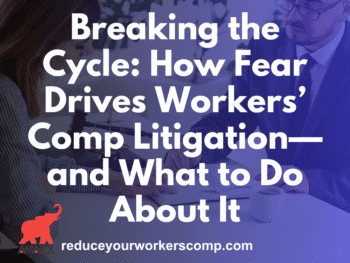How Would You Decide: Surviving Spouse of Defense Contractor’s Employee in Iraq Fails to Establish Husband’s Suicide Was Caused By Post-Traumatic Stress Disorder
Here’s what Tom Robinson, J.D., writer for Lexis Nexis Workers Comp Law Center reports.
Here’s What Happened:
Decedent, who worked for a defense contractor in Iraq, committed suicide. His widow sought benefits under the Defense Base Act (42 U.S.C.S. § 1651, et seq., which, in turn, is an extension of the Longshore and Harbor Worker’s Compensation Act, 33 U.S.C.S. § 901, et seq.), contending the death arose out of decedent’s employment because it was the result of post-traumatic stress disorder (“PTSD”). The administrative law judge determined that the death did not arise out of the employment since it resulted from the voluntary act of the decedent. The Benefits Review Board affirmed the decision and the widow appealed.
Here’s What The Court Decided:
In Eysselinck v. Director, Office of Workers’ Comp. Programs, 2009 U.S. Dist. LEXIS 105664 (S.D Tex. Nov. 12, 2009), the District Court for the Southern District of Texas affirmed. Before the court was the memorandum and recommendations of the magistrate judge and the widow’s objections thereto. Initially, the court indicated that in the usual case, the taking of one’s life with willful intention to do so would negate the possibility of recovering benefits, but that in Voris v. Texas Employers Ins. Assoc., 190 F.2d 929, (5th Cir. 1951), the Fifth Circuit had carved out an exception for suicide that was the result of insanity. The court noted that the magistrate judge had carefully reviewed the evidence of PTSD and had noted the lack of life-threatening events experienced by decedent and the fact that decedent had not received any psychiatric examinations before his suicide. According to the court, the widow had failed to convince the law judge that the decedent suffered from PTSD at all. As to the widow’s alternative argument that decedent had committed suicide as a result of depression, the court noted that a medical expert’s testimony had implicitly eliminated depression as a contributing cause of decedent’s suicide, and that in any event, if the depression was present along with the PTSD, the real issue was whether PTSD, or the combination of PTSD and depression, could overcome the voluntary intentions of the decedent such that his suicide could be described as involuntary. In other words, the issue was not whether the decedent had PTSD or depression, or both, but whether the suicide was voluntary. The district reiterated that the Benefit Review Board was required to accept the findings of the law judge unless they were not supported by substantial evidence, that the Board did not have the statutory authority to engage in a de novo review of the evidence or to substitute its views for those of the law judge. Here the record was replete with arguments for and against a finding that decedent had PTSD and that the PTSD resulted from decedent’s work in Iraq. (workersxzcompxzkit) Since there was substantial evidence to support the law judge’s decision, the court indicated “the inquiry ends there.”
See generally Larson’s Workers’ Compensation Law, §§ 38.01, 38.02, 38.03, 149.02.
Tom Robinson, J.D. is the primary upkeep writer for Larson’s Workers’ Compensation Law (LexisNexis) and Larson’s Workers’ Compensation, Desk Edition (LexisNexis). He is a contributing writer for California Compensation Cases (LexisNexis) and Benefits Review Board – Longshore Reporter(LexisNexis), and is a contributing author to New York Workers’ Compensation Handbook(LexisNexis). Robinson is an authority in the area of workers’ compensation and we are happy to have him as a Guest Contributor to Workers’ Comp Kit Blog. Tom can be reached at: compwriter@gmail.com.
http://law.lexisnexis.com/practiceareas/Workers-Compensation
TO DOWNLOAD FREE “FRAUD PREVENTION” AUDIO PODCAST click here: http://www.workerscompkit.com/gallagher/mp3
By: Anthony Van Gorp, private investigator with 25 years experience.
WC Books: http://www.reduceyourworkerscomp.com/workers-comp-books-manuals.php
TD Calculator: www.ReduceYourWorkersComp.com/transitional-duty-cost-calculator.php
Do not use this information without independent verification. All state laws vary. You should consult with your insurance broker about workers’ comp issues.
©2009 Amaxx Risk Solutions, Inc. All rights reserved under International Copyright Law. If you would like permission to reprint this material, contact Info@WorkersCompKit.com



























